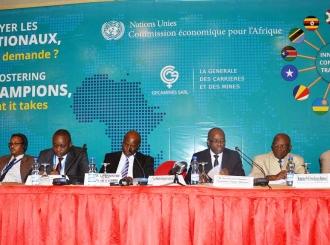
Kinshasa, 18 February 2014 (ECA) - The Intergovernmental Committee of Experts meeting in Kinshasa, Democratic Republic of Congo (DRC) this year is on the topic of National Champions, Foreign Direct Investment (FDI) and Structural Transformation in Eastern Africa.
“The term ‘national champions’ refers to large-scale companies which are potentially competitive in national, regional, or international markets and are owned either by the state or predominantly by nationals or citizens from the region”
The Eastern Africa region has enjoyed impressive growth, but has not been able to make a dent in the poverty levels or create enough jobs. That's why experts from the 14 countries of Eastern Africa are meeting in Kinshasa, to see to what extent their governments can foster national champions to attain sustainable growth and structural transformation of their economies.
“This paradox – growing wealth, but more poor people - is a sure testimony that more needs to be done to make sure that the proceeds of growth are invested well for the future development of the region”, said Antonio Pedro, Director of United Nations Economic Commission for Africa, Sub-regional Office for Eastern Africa office.
Growth rates in the Eastern Africa region between 2008 and 2013 were on average 6.7 per cent.
The experts in Kinshasa are examining how much can be expected of domestic investors through Foreign Direct Investment and how knowledge and technological skills can be transferred to local players and value added from FDI expanded.
Pedro said that Eastern Africa region has an already impressive list of companies and firms which are competing regionally. Firms like Ethiopian Airlines, Equity Bank in Kenya, Gecamines in DRC and many more have all adopted ambitious plans to increase their international competitiveness. “Nurturing these ‘national champions’ is no easy matter! It requires some long-term strategic choices, embedded in comprehensive industrial policy and local content programmes” said Pedro.
He added that the continent needs a massive Africapitalism revolution with a human face to trigger Africa structural transformation. Africapitalism, in this sense, means African nationals being at the forefront of efforts to develop African economy through business.
Pedro emphasized that the first choice is the need to decide whether it will be possible, within a reasonable timeframe, to build up national capacities in a particular sector, or whether depending on the technological, financial and proprietary advantages of multinational corporations is a more realistic strategy.
While opening the meeting, Hon. Célestin Vunabandi Kanyamihigo, DRC Minister of Planning and monitoring recalled that massive industrialization is beneficial for the continent to boost employment creation. He therefore urged governments in the region to support national and regional champions with emphasis on those investing in industrialization and manufacturing.
Provocative and deliberate actions from key stakeholders, especially the state will be required to support the establishment of national champions. He added that the DRC has started the exercise to reform the laws that might boost up the business and investment environment in DR Congo.
The” Guichet unique” created by the government in 2009, which is a one-stop centre for business registration helps businesses to start their operations after complying with three simplified steps. The registration process takes only three days.
The minister Vunabandi hailed the ICE as an important forum to share country experiences on how to harness good practices and lessons learnt from other emerging economies and opportunities for south-south exchange in promoting National Champions.
“We are happy to host and chair the Intergovernmental Committee of Experts, in this time where our country is going through a series of transformation in the framework known as “Revolution of modernization” with the aim of catalyzing economical and social development of the country", said Minister Vunabandi. "My government is taking initiatives to boost several sectors such as Agri-business as part of our vision 2030 and is planning the creation of several economic zones across the country so that by 2060 our country will become a global powerful and developed nation".
The Intergovernmental Committee of Experts (ICE), an organ of the UN Economic Commission for Africa (UNECA), meets every year to discuss the challenges facing the 14 Member states.
Full speech of Antonio Pedro while opening the 18th ICE can be accessed here
Issued by:
ECA External Communications and Media Relations Section
PO Box 3001
Addis Ababa
Ethiopia
Tel: +251 11 551 5826
E-mail: ecainfo@uneca.org
www.uneca.org